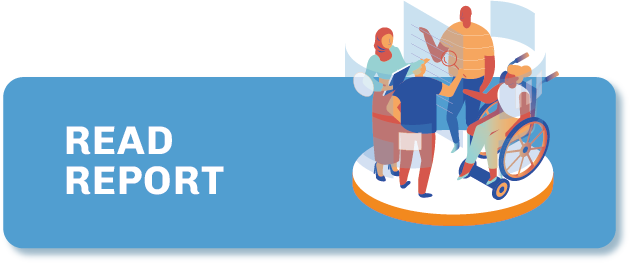Albania
Journalists are launching digital media organisations in Albania, but only a few of these have a sustainable business model. Challenged by the strong influence of bigger media groups, especially broadcasters, digital native media outlets in Albania operate with limited human and financial capacities. In most cases, this financial capacity consists of revenue from advertising, as well as grants from private companies and international organisations. Due to the relative fragility of its institutions, political reporting dominates the country’s media landscape, followed by investigative reporting on topics such as organised crime and corruption.
GENERAL INFORMATION
Press
freedom
ranking
Internet
penetration
POPULATION
Media organisations
in the Directory
TYPE OF COVERAGE

TYPE OF ORGANISATION

GENDER OF FOUNDERS
Press freedom
Although Albania’s constitution and laws guarantee freedom of the press and freedom of expression, journalists and media outlets are exposed to various threats and pressures from interest groups and political parties. “While editorial independence is threatened by partisan media regulation, the physical integrity of journalists is undermined by organised crime, the state’s failure to protect them and even by police violence,” notes Reporters Without Borders.
Albania continues to experience a deterioration in media freedom overall, according to a fact-finding mission by the partners of the Council of Europe’s Platform for the Protection of Journalism and Safety of Journalists. Investigators also note the country’s lack of progress in improving the environment for independent and watchdog journalism as well as media pluralism.
While physical attacks against journalists remain rare, politicians continue in their efforts to discredit them. “While the use of aggressive and insulting language by the prime minister Edi Rama against the media has decreased, the act of telling some journalists who ask challenging questions that they need to undergo so-called ‘re-education’, accompanied by unilateral bans from attending press conferences, have proven even more damaging,” notes the European Federation of Journalists.
Market structure and dominance
The rise of digital native media organisations in Albania has been hindered by the large influence of legacy media, including television and newspapers. Television continues to have the greatest influence, even amid the audience growth experienced by digital media outlets in recent years (triggered by the creative content published on these digital platforms). Compared with traditional media, the new digital native media outlets are focusing on in-depth investigations, fact-checking and solutions-based journalism. All this is playing a big role in the switch by audiences from traditional media to new digital media outlets.
How media is funded
The main source of revenue for the majority of digital native media outlets in Albania comes from advertising, while “the most influential Albanian private media are owned by a handful of companies which have links to politicians, and at the same time operate in highly regulated sectors such as construction,” according to Reporters Without Borders.
Existing public funding is constantly criticised due to its unequal distribution, as well as suspicions concerning the exertion of influence over the media’s editorial independence. Transparency is missing, non-profit organisation IREX notes in its Albania Vibrant Information Barometer 2022 report, “as the details are hard to track down, amid multiple projects used to channel funds to media outlets from the public budget”.
Albania’s advertising market is estimated at €40 million, the report adds, with approximately 70% going to the three national television stations. According to the 2021 financial report of public broadcaster Radio Televizioni Shqiptar (RTSH), 61% of its revenue comes from a service fee that Albanians pay for the use of radio-television devices, 26% from the state budget and the remainder from collaborations, advertising and the renting of transmission antennas. Due to a lack of funds, the non-profit sector is facing an increasingly challenging environment.
Five profiles of digital native media organisations from Albania are included in the directory. All of them are founded by journalists who started their own media outlets due to control and censorship in the media, with the aim of offering independent journalism.
One example is BIRN Albania, which specialises in investigative reporting, publishing and media monitoring. According to its executive director Kristina Voko, the organisation decided to launch Reporter.al in 2014, committing “to give a voice to civil society and vulnerable groups in Albania, as their voices are not heard in the commercial media”. A lack of professional and investigative journalism has motivated the outlet to investigate and publish cases of corruption, impunity and abuse of power.
In terms of content, most of the media outlets included in the directory can be considered generalist media, providing coverage that is national in scope. There is a lack of local media outlets and of those specialising in topics such as the environment, economy, human rights and minority rights. These media organisations use many tools to share their content such as Facebook, Instagram, Twitter, YouTube and, lately, TikTok, but none of them currently make use of platforms such as newsletters, WhatsApp or other communications platforms.
Due to a lack of financial sustainability, these media outlets consist of a small number of staff – mainly between five and 20 employees – which includes all departments from content production, marketing and sales, IT and finance. Most media outlets (both digital and traditional) depend mostly on advertising, and this leaves them exposed to interference from both business groups and political parties.
Television dominates the media landscape and receives the largest proportion of businesses’ advertising spend. Challenged by this situation, some digital media outlets are focusing on video production and web TV platforms.
For example, the media outlet City News Albania applied for a web TV licence in 2022. According to CEO Elvi Fundo, the organisation hopes to increase its advertising revenue and thus strengthen its sustainability by adding this new product.
The common challenge facing all media outlets in Albania remains financial sustainability. Digital native media outlets, which are emerging every day, should build a sustainable business model that would make it possible for them to grow and improve on their professional standards. This type of media outlet should engage more in cooperation in joint projects aimed at reporting on important topics such as the economy, environment, education, health and welfare.
Last updated: December 2022
CREDIT FOR STATISTICS: Press Freedom statistics, RSF Press Freedom Index 2022; Internet penetration and population statistics, from Internet World Stats

